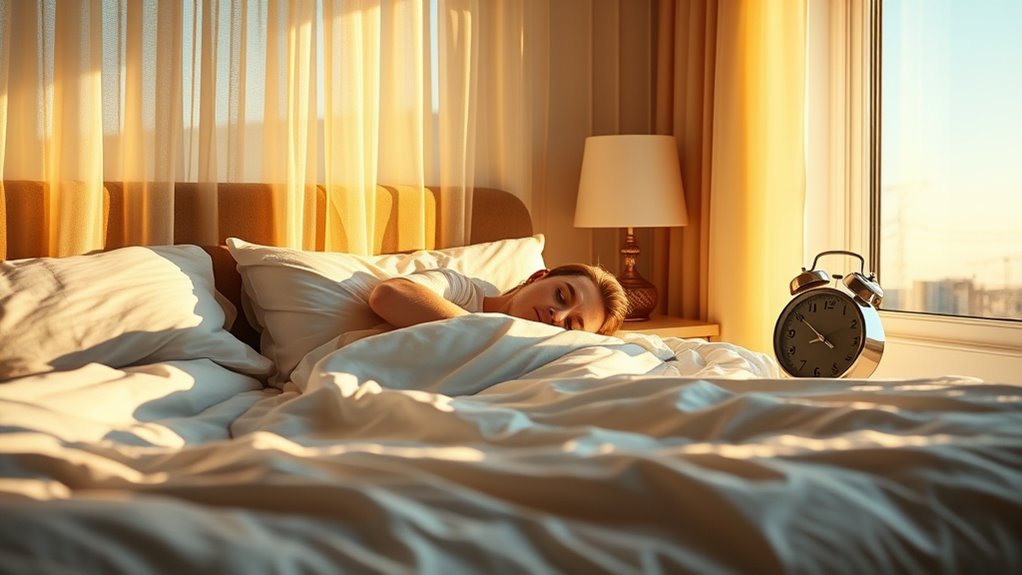Understanding your chronotype helps you align your daily activities with your body’s natural rhythms. Whether you’re a morning lark or a night owl, scheduling demanding tasks during peak alertness times boosts focus and energy. Adjusting your routine to match these rhythms reduces fatigue and improves sleep quality. When you work with your body’s clock, you can optimize productivity and well-being. Keep exploring to discover how to personalize your schedule even further.
Key Takeaways
- Understanding your chronotype helps identify your peak alertness times for optimal task scheduling.
- Morning types perform best early in the day, while night owls are more alert late at night.
- Aligning activities with your body clock improves focus, productivity, and sleep quality.
- Adjusting your daily routine to match your natural rhythm reduces fatigue and burnout.
- Recognizing your circadian patterns allows personalized scheduling for better overall well-being.

Have you ever wondered why you’re most alert in the morning while your friend prefers late-night activities? It all comes down to your chronotype—the natural rhythm that determines your sleep cycle and how you align with the day. Your chronotype influences when you feel most energized, alert, and productive. Understanding this can transform how you schedule your day, making it easier to optimize your productivity timing and overall well-being.
Your chronotype shapes your alertness, energy, and productivity—align your schedule with your natural rhythm for better results.
Your sleep cycle is a vital part of this puzzle. It’s the internal clock that regulates your sleep-wake patterns, syncing with the circadian rhythm. If you’re a morning person, your body naturally wants to wake up early and wind down sooner in the evening. Conversely, night owls hit their stride late at night, often feeling sluggish or less focused in the mornings. Recognizing your sleep cycle helps you identify when you’re most likely to be at your peak mental and physical performance, so you can plan your tasks accordingly.
Scheduling your day around your chronotype isn’t just about when you sleep; it’s about aligning your most demanding activities with your natural energy peaks. For instance, if you’re a morning person, you’ll likely find that tackling complex work, problem-solving, or creative tasks during the first half of the day yields better results. Your productivity timing aligns with your body’s natural alertness, allowing you to work smarter, not harder. Night owls, on the other hand, often find their focus and motivation surge later in the day or into the night, so shifting your most intensive work to these hours can improve efficiency and reduce burnout.
Adjusting your schedule to fit your chronotype isn’t always straightforward, especially if societal demands pull you away from your natural rhythm. But small changes, like delaying start times or reserving mornings for routine or less demanding tasks, can make a significant difference. By respecting your sleep cycle and adapting your activities to your productivity timing, you give yourself a better chance to perform at your best. This approach minimizes fatigue, enhances focus, and boosts your overall mood.
In essence, understanding your chronotype empowers you to design a daily schedule that works with your body rather than against it. When you align your activities with your natural rhythm, you’ll notice increased efficiency, better sleep quality, and a more balanced, energized life. So, pay attention to your body’s signals, experiment with your schedule, and let your body clock guide your day for ideal results. Recognizing the role of contrast ratio in your visual setup can also help optimize your environment for alertness and comfort, especially during your peak hours.
Frequently Asked Questions
Can Chronotypes Change Over Time?
Yes, your chronotype can change over time due to biological variations and lifestyle influences. Your body’s internal clock isn’t fixed; it adapts based on age, habits, and environment. If you shift your sleep schedule, reduce stress, or improve your sleep hygiene, you may notice changes in whether you’re more of a morning or evening person. Embracing these shifts helps you align better with your natural rhythms for improved well-being.
How Do I Identify My Chronotype Accurately?
To identify your chronotype accurately, pay attention to your natural sleep patterns and energy levels throughout the day. Track when you feel most alert and when you tend to get sleepy over a week. You can also observe biological markers like core body temperature and melatonin production. Using sleep diaries or wearable devices helps pinpoint your body’s rhythms, so you can align your schedule for ideal productivity and rest.
What Are Common Health Issues Linked to Chronotypes?
You might face health issues linked to your chronotype, such as sleep problems, metabolic concerns, or mood swings. Genetic predispositions and hormonal fluctuations influence these risks, making it essential to understand your body’s natural rhythms. When you ignore your chronotype, you risk disrupting your sleep cycle, increasing stress, and heightening the chance of chronic conditions. Embracing your unique schedule can help maintain your overall health and well-being.
Can Adjusting My Schedule Improve Sleep Quality?
Adjusting your schedule can definitely improve your sleep quality by aligning with your circadian rhythm. Focus on maintaining good sleep hygiene by sticking to consistent bedtimes and limiting screen time before sleep. When you match your activities to your body’s natural pattern, you’ll find it easier to fall asleep and stay asleep. This synchronization helps your body regulate hormones and improves overall rest, making you feel more refreshed each day.
Are There Specific Diets Suited to Different Chronotypes?
You wonder if specific diets suit your chronotype. The answer is yes—diet compatibility and meal timing play essential roles. For morning larks, lighter dinners and breakfast-focused meals boost energy. Night owls benefit from later, protein-rich dinners. By aligning your diet with your body’s natural rhythms, you support better digestion, improved energy, and overall health. Adjusting meal timing to match your chronotype makes your diet more effective and sustainable.
Conclusion
By understanding your chronotype, you can sync your day with your body’s natural rhythm, like a well-tuned orchestra playing in harmony. Imagine trying to run a marathon at midnight when your body’s primed for dawn—you’re setting yourself up for struggle. Embracing your unique schedule isn’t just about productivity; it’s about respecting your body’s clock. When you align your activities with your chronotype, you’ll find your day flows smoother, just like a melody in perfect sync.









